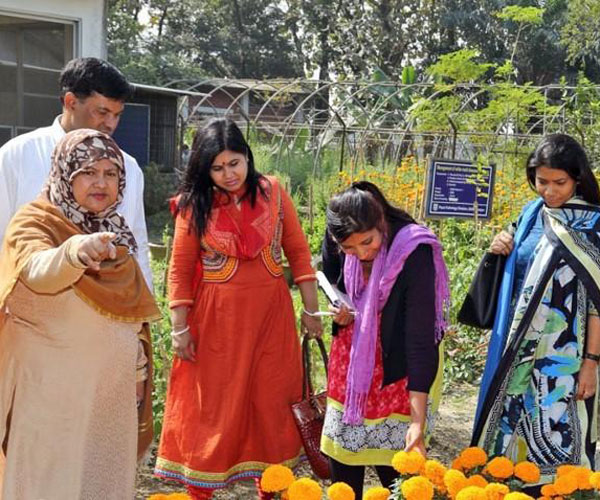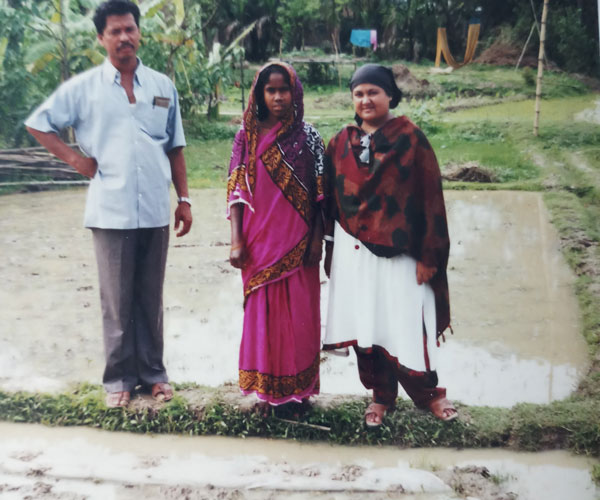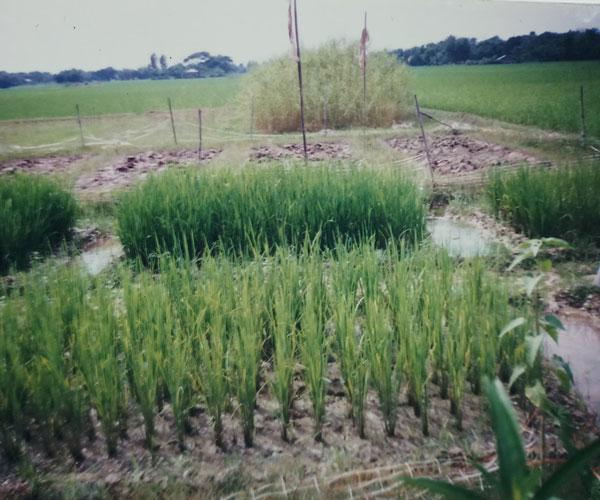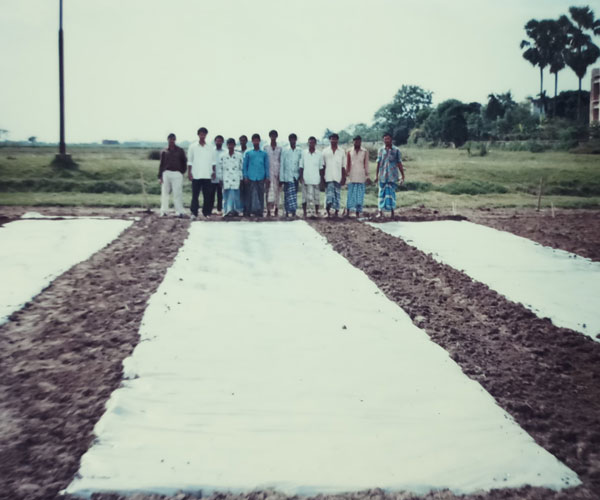
As a girl, Bangladeshi agricultural scientist Salina Banu dreamt of being a doctor. While applying to universities, however, she realized she could make a bigger impact as an agricultural scientist, helping in the advancement of her agriculture-based country also because there were very few female students in that field.
She decided to study agriculture, and now, with a career ranging 35 years, she has become an undisputed leader in soil biological health, eco-friendly crop-growing techniques, disease-resistant varieties, post-harvest challenges and management of agro-industrial waste. It was her participation in a TWAS science diplomacy workshop that further helped propel her career internationally.
"When they chose me as a participant in the 2015 TWAS science diplomacy workshop I had no idea how much it would change my approach to science," said Banu, who is the former head of the Plant Pathology Division and Chief Scientific Officer at the Bangladesh Agricultural Research Institute (BARI), in Gazipur, Bangladesh.
"The event was intense; I learned how I could deploy my experiences and objectives more effectively. Upon my return home, I gave a seminar for all the scientists in my institute. Since then, I have run many seminars on leadership, science diplomacy, innovation and knowledge management,” she added.
Science Diplomacy [https://twas.org/science-diplomacy] is one of TWAS flagship programmes. Launched in 2011, it offers summer courses, thematic meetings and regional workshops. The events expose scientists, scholars, policymakers, diplomats and other stakeholders to negotiation and leadership skills, cooperation, providing them with tips on how to present advice at high-level meetings and attract more funds for projects.
In November 2020, TWAS organized its first Science Diplomacy Alumni Review Meeting to explore if and how former alumni make an impact in their communities through the skills learned thanks to TWAS. In particular, the event aimed at confirming that the science diplomacy programme helps participants increase awareness of their potential impact while improving individual capacity to engage in productive actions.
From more than 300 participants from 80 countries who attended the TWAS science diplomacy events, Salina Banu was one of 30 selected to provide their contributions.
Awareness offers choices
Born in the village of Debiganj in the Panchagarh district of Bangladesh, Banu was the daughter of an open-minded teacher who always encouraged her to go for higher education. He helped her practice English at home since she was a child, brought her international magazines, and put her in touch with international pen pals. Later on, Banu realized that her chance to make a change in her community would be through agriculture.
"Bangladesh is an agriculture-based country, but agriculture is traditionally a prerogative of women, who are still a neglected part of society," she observed. "When I was admitted to the Bangladesh Agricultural University (BAU), I found out there were only four female students in the entire faculty of agriculture, including myself. This is how I realized that my chance to make an impact was with agricultural science. Today, there are more than 50 percent female students at BAU."
Her career started in 1985 at BARI, the same institute where she would later serve as the Chief Scientific Officer. In 1993, she moved to Australia and, in 1997, obtained a Master of Science in agriculture from the University of Sydney. Those were hard years for Banu: she was 33 and had just lost her husband in a car accident that left her a single mother with two young girls. At the same time, she was building her scientific research career. Her Australian education helped Banu recognize the importance of science and the way science should be carried out.
From 1996 to 2002, Banu was a principal investigator for the U.S. Agency for International Development (USAID) project “Soil Management Collaborative Research Support Program,” in association with Cornell University, U.S. She also ran projects as a country coordinator with the Rice-Wheat Consortium for the Indo-Gangetic Plains and conducted research with the International Maize and Wheat Improvement Center, which helped her establish new international collaborations.
Banu then became a full-time researcher at the International Rice Research Institute, the Philippines in 2002, thanks to a fellowship received by the Organization for Women in Science for the Developing World (OWSD), headquartered in Trieste. There she discovered two genes that give resistance to an important rice disease called brown spot (Bipolaris oryzae). In 2008, she earned her PhD in plant pathology from the Bangladesh Agricultural University in Mymensingh, Bangladesh. She published this research at the Ninth International Congress of Plant Pathology in 2008 in Turin, Italy — the beginning of a productive path.
As her career was unfolding, she made herself a promise: she would work for the world, promoting the socially responsible use of science and technology. She also considered the ethical implications of her work and committed to promoting respectful development.
At BARI, Banu set up modern, well-equipped laboratories. She innovated a healthy seedling development technology through soil solarization, which was then upscaled in many countries and described at several international conferences, including the Expo Milan 2015 held in Milan, Italy, whose theme was "Feeding the Planet, Energy for Life." On that occasion, Banu represented her government as an agricultural expert.
Capacity in action
"The environmentally eco-friendly technology I devised allows the use of a lower amount of fertilizers, pesticides and chemicals," Banu explained. "The healthy seedlings, especially rice, grow into healthy plants."
The technique is quite simple and effective. During the summer, farmers lay clear plastic on the soil, making sure they are airtight for 4–6 weeks. "After this so-called 'solarization' treatment, the soil becomes richer in nutrients and is free of pests, pathogens, and weeds, and is ready for seeding."
To disseminate this practice, Banu selected women farmers to whom she explained the procedure. "They learned it soon and applied it to their fields near their homes.” Because rice is a food staple in Bangladesh, Banu concentrated on rice-wheat cropping system research. She also developed new wheat varieties with higher yields and disease-resistance. To grant better nutrition for all, she also worked to increase the shelf life of fruits and vegetables.
Salina Banu is also an advisor for the OWSD Bangladesh chapter and an advisor and fundraiser for Apon Nibash, a shelter for disadvantaged elderly women in Dhaka, Bangladesh. She is a core group member of the Australia Awards Women in Leadership Network of Bangladesh. In memory of her late husband, she established the “Agriculturist Abu Khaled Trust” to recognize the contributions of women farmers in Bangladesh.
The high number of awards Banu received cannot portray the real impact of her scientific activity. They include the Haji Muslim-Khurshida Gold Medal (2009) for soil biological health research; the Australian Alumni Excellence Award (2014) for brown spot research; and the Mahatma Gandhi Peace Award (2017) in recognition of her commitment as a successful scientist and social worker.
Now, retired from the government service, Banu is still targeting important scientific goals. She is working as a consultant for agricultural organizations and she is involved with the science community, as well as women’s empowerment programmes. She envisions a future where she is part of an international team willing to strengthen research and social development through inclusive and resilient agriculture, coupled with women’s leadership.
"I believe students, especially female students from developing countries, should strive for a science education because in this way they can contribute more to the development of their countries," she observed. “Unfortunately, students have lower interest in science. Governments, schools, universities, and science-based organizations should encourage students and young professionals to pursue science education and careers.”
“Most women in developing countries are conditioned to view marriage as their ultimate goal in life. I try to inspire them and convince them and their parents that they can both have higher education in science and a family. There may be some hardships along the way, but I and many other women are proof that you can succeed through hard work and perseverance.”
Cristina Serra

